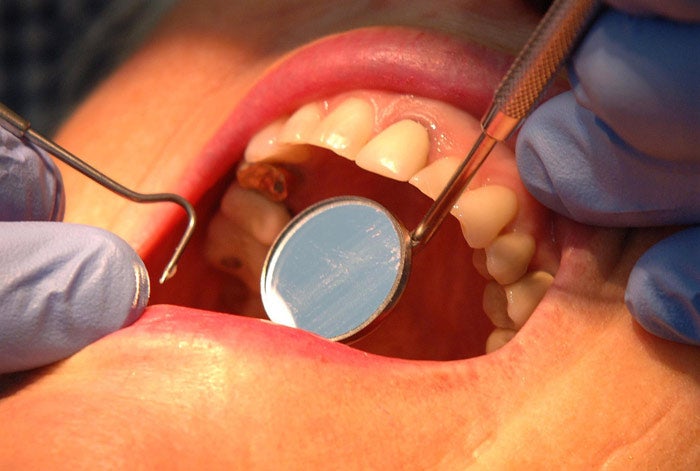Young dentists desert the NHS in favour of lucrative private work

Your support helps us to tell the story
From reproductive rights to climate change to Big Tech, The Independent is on the ground when the story is developing. Whether it's investigating the financials of Elon Musk's pro-Trump PAC or producing our latest documentary, 'The A Word', which shines a light on the American women fighting for reproductive rights, we know how important it is to parse out the facts from the messaging.
At such a critical moment in US history, we need reporters on the ground. Your donation allows us to keep sending journalists to speak to both sides of the story.
The Independent is trusted by Americans across the entire political spectrum. And unlike many other quality news outlets, we choose not to lock Americans out of our reporting and analysis with paywalls. We believe quality journalism should be available to everyone, paid for by those who can afford it.
Your support makes all the difference.The boom in teeth-whitening and capping has led to a further drain on young dentists who appear to be switching from the NHS to highly lucrative private cosmetic treatment.
Gordon Brown is among those who are said to have their smiles improved by professional teeth-whitening but the growth in the business could be exacerbating the lack of availability of NHS dentists.
Figures produced from the NHS Information Centre showed that dentists under 35 years old in 2000-01 earned 65 per cent of their income from the NHS but, by 2005-6, that had nearly halved to 36 per cent.
That compares to dentists in the older age groups who have seen a much smaller change. Dentists aged 55 and older received 58 per cent of their income from the NHS in 2000-1 but by 2005-6 the share from the NHS had declined to 47 per cent.
A note of caution was added by the dental profession who said the study was a small sample, but it reinforces fears that a new contract for dentists has failed to reverse the exodus of dentists from NHS care.
Ann Keen, the Health minister responsible for dentistry, will be questioned this morning about the figures at a hearing of the Commons select committee on health, which is carrying out an investigation into the shortage of NHS dentists.
Dr Howard Stoate, a GP and the Labour chairman of the all-party Commons primary care committee, said: "If it is true [that] a large number are switching to private care, it would be worrying. The primary care trusts take the view that there are enough dentists coming forward because it does seem that they are able to offer a dental service that does seem to be better than before."
Young dentists who are benefiting from the trend to more cosmetic treatment include Ben Atkins, 32, who has built up his own nine-dentist Rocky Lane Dental Practice. The practice earns 80 per cent of its income from NHS patients but Mr Atkins says "patients are exercising more and more choice".
He said patients were prepared to pay for the extra services and time they can get through private consultations which meant they were opting out of the NHS. "Lots of people want cosmetic dentistry and that is their right," he said. "Many patients will say they do not want the silver fillings and are prepared to pay for white fillings."
But Mr Atkins denied younger dentists are wilfully turning their backs on the NHS. He believes younger dentists still want to do NHS work, but are often faced by a lack of opportunities.
Government figures last month showed that more than 500,000 fewer patients were seen in the past two years, compared to the 24 months prior to the introduction of a new contract in 2006.
The new statistics were published as evidence emerged that complaints about NHS dental treatment are on the rise. A survey of primary care trusts for the Patients Association found widespread problems following the introduction of a new dental contract in 2006.
It sent questionnaires to the chairmen and dental commissioners of 150 PCTs in England, and 112 replied. The report – The New Dental Contract: Full of Holes and Causing Pain? – found problems with funding, prevention work and patient experiences. It said: "PCTs complain there is a widespread lack of funds for orthodontics and other specialist treatments and cite this funding gap as the reason for not implementing best practice. There is increasing concern for the preventive role of dentistry in detection of oral health disease."
The report found that complaints had risen, with more than half of PCTs admitting an increase in the number of complaints. Of these, 60 per cent were about charges, 37.6 per cent about access and 28.2 per cent directly about orthodontics.
Peter Ward, chief executive of the BDA, said: "The new dental contract limits the amount of NHS dentistry that primary care trusts can commission. The result is that some dentists who want to provide NHS care are unable to do so and that millions of people who wish to access NHS care cannot."
GPs are also expected today to reluctantly support changes to their new contract which will pay their practices an extra 1.5 per cent for longer opening hours at night and at weekends. The results of the ballot will be announced by the BMA, which last week said it was backing this option. One Labour MP said GPs were choosing "the least worst option".
Join our commenting forum
Join thought-provoking conversations, follow other Independent readers and see their replies
Comments